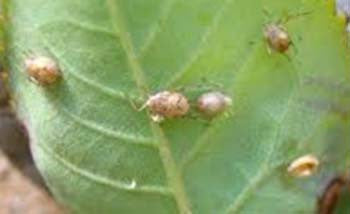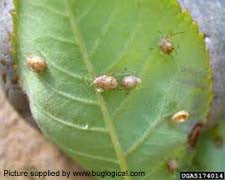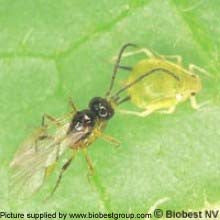
The Mummy! Or thousands of mummies…
Share
Here at Glenlea Greenhouses we have used biological control to manage pest problems on our spring crops! We choose to use biological control so that you as the customer can know you are getting a safe product for you and your family. This is part of a management technique called Integrated Pest Management (IPM). It involves a variety of management techniques to control pest populations in our greenhouse crop. Since there are so many different types of crops in the greenhouse we have to be very aware of what is happening to every plant, every day. It all starts by making sure the greenhouse floors are clean and tidy to help remove sources of food and shelter for pest insects. Mother Nature does a great job of freezing everything in the greenhouses in the off season but there are still places for pests to hide. We have to go through each greenhouse at the end of the season and clean out every crevice (that means vacuuming the greenhouse) to suck up old soil and weed seeds that may have been left behind.
During the busy spring we have to rely on other techniques to help us control pest problems. To help you understand how these systems work, I’ve created a fun blog describing our methods!
Today’s blog is going to be about Aphidius colemani.
Over the years I’m sure you’ve noticed small gold balls on some leaves at the greenhouse. These gold balls are parasitized aphid mummies created by a wasp called Aphidius colemani. These wasps are very small and do not sting people, they only attack aphids! Aphidius use the aphids as a host for their eggs to grow and they use their ovipositor to lay their egg in the aphid where it stays until it develops into an adult.
 During the spring we place host plants with aphids within the greenhouses so that each greenhouse has their own army of mummy making wasps to protect your plants from the dreaded aphids each year. To make sure we have enough aphids for the wasps to lay their eggs in, we have to “farm” our own aphid colonies. Why would we want to intentionally bring aphids into the greenhouse? Wouldn’t they get out of control and cause problems that we were trying to prevent? Yes, if they were the wrong kind of aphid! In the spring we bring in special aphids that only live on grasses called cereal aphids. These aphids live only on grass plants such as wheat and barley. We grow these aphid populations in protected baskets, called bankers, and keep them away from the Aphidius so that there will always be a source of food when the greenhouses are cleaned of aphids. We then reintroduce an aphid host plants to a greenhouse to replenish the food supply to keep the Aphidius population healthy.
During the spring we place host plants with aphids within the greenhouses so that each greenhouse has their own army of mummy making wasps to protect your plants from the dreaded aphids each year. To make sure we have enough aphids for the wasps to lay their eggs in, we have to “farm” our own aphid colonies. Why would we want to intentionally bring aphids into the greenhouse? Wouldn’t they get out of control and cause problems that we were trying to prevent? Yes, if they were the wrong kind of aphid! In the spring we bring in special aphids that only live on grasses called cereal aphids. These aphids live only on grass plants such as wheat and barley. We grow these aphid populations in protected baskets, called bankers, and keep them away from the Aphidius so that there will always be a source of food when the greenhouses are cleaned of aphids. We then reintroduce an aphid host plants to a greenhouse to replenish the food supply to keep the Aphidius population healthy.
 Next time you see the little gold balls treat them as living gold! Bringing these wasp eggs home with you will help protect your plants from aphids down the line. So don’t think of them as icky, or something wrong with the plant, but instead it is our army of silent helpers watching the greenhouse when we can’t!
Next time you see the little gold balls treat them as living gold! Bringing these wasp eggs home with you will help protect your plants from aphids down the line. So don’t think of them as icky, or something wrong with the plant, but instead it is our army of silent helpers watching the greenhouse when we can’t!
